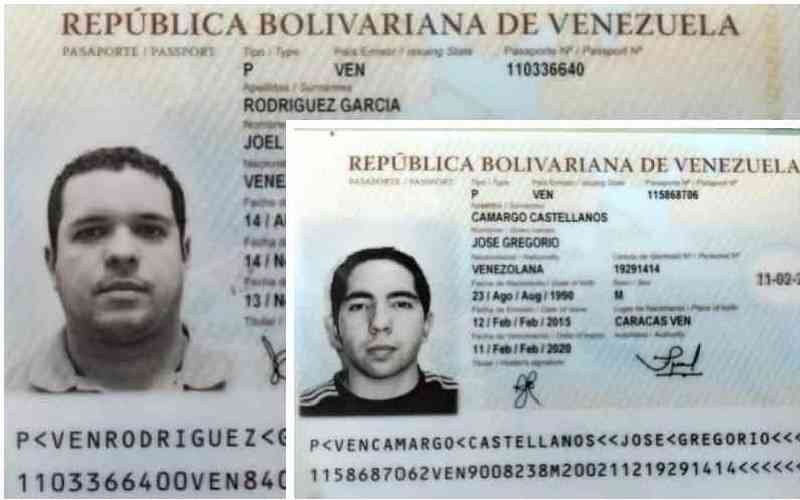The High Court in Nairobi has ordered the Directorate of Criminal Investigations (DCI) to provide a report on their probe regarding three Venezuelans as requested by Azimio la Umoja One Kenya presidential candidate Raila Odinga and his running mate Martha Karua.
Raila and Karua had gone to court seeking to have DCI compelled to produce the report to buttress their presidential election petition challenging the Independent Electoral and Boundaries Commission (IEBC) declaration of William Ruto as president-elect.
Jose Camargo, Joel Gustavo and Salvador Javier Sosa were arrested last month at Jomo Kenyatta International Airport (JKIA) with IEBC election materials.
In granting Karua’s prayers, Justice Hedwig Ongu’ndi directed DCI to furnish the report to her within 12 hours.
“Upon perusal of the pleadings, supporting affidavit and annexures, I am satisfied that the main prayer sought in the notice of motion is merited to enable the petitioner file her documents at the Supreme Court,” ruled Justice Ong’undi.
Following the order, Assistant Superintendent of Police Peter Maina has availed the same document before the Supreme Court.
According to him, a separate petition filed by activist Khelef Khalifa, George Osewe, Ruth Mumbi and Grace Kamau has alleged that there were criminal activities that undermined the electoral process.
Maina in his reply filed on his behalf by the Attorney General Kihara Kariuki’s office states that the report was supplied to Karua after the orders on August 22.
Raila and Karua in their petition revisited the Venezuelan saga. They insisted in their petition before the Supreme Court that the conduct of Camargo, Gustavo and Sosa cannot be wished away.
The Azimio leaders argued that the arrest of the trio with KIEMs stickers was an indicator of how IEBC was allegedly casually handling the election process.
Benson Wesonga filed court papers in support of Raila and Karua’s petition. In his papers, Wesonga says that despite the issues raised by detectives, IEBC chairman Wafula Chebukati was the only one who defended them.
“Interestingly, despite the irregularities unearthed by the DCI over the casual and reckless manner with which the strategic electoral materials were handled by the three Venezuelans, the chairperson of the commission unilaterally defended the said individuals,” says Wesonga.
Authorities had detained the three while investigating why the KIEMs stickers they were carrying were not declared in accordance with the law.
Police said they want to establish why such sensitive election materials were not accompanied by an IEBC official as per the routine procedure.
Further, they stated that they ought to have been notified of the importation of election-related material beforehand to “provide necessary security and escort”.
At the same time, the law enforcement agencies stated that they were in Kenya as private individuals and not IEBC employees.
DCI boss George Kinoti stated in a press statement that Gregorio had been intercepted with Nairobi (3), Kiambu (2), Nakuru (2, Meru (2, Murang’a (1), Bomet (1), Nyeri (1), Tharaka Nithi (1), Nyandarua (1), Kericho and one unprinted roll of election stickers.
In a two-page press statement dated July 25, Chebukati said the three Venezuelan nationals arrested at the JKIA on July 21, were in the country legally, and that they are employees of Smartmatic, a company contracted by IEBC to aid in technology roll-out.
He said Smartmatic, a company headquartered in London, United Kingdom procedurally won the Sh3.2 billion technology tender.
“It is important to note that the stickers are non-strategic election materials. The stickers were printed based on the details of the gazette notice published on July 1, 2022. The information therein is available to the public,” said Chebukati while responding to the DCI’s concerns that the foreigners were on a suspect mission.
The stickers contain information on the polling stations, polling centres, wards, constituencies and counties as well as unique barcodes, added the IEBC chairperson.
The spat between DCI and IEBC fizzled out as elections fast approached.
However, following the presidential results dispute, Raila and Karua revisited matter linking the Venezuelans to vote manipulation and system hacking – all meant to tilt the final tally.
According to them, the IEBC election system was corruptly managed and deployed in such way that it yielded variables that cannot be ascertained. In their report, the DCI say they recovered a one TB external disc, one laptop, six flash disk, three mobile phones, one tablet, one simcards and a monitor.
Their findings were the laptop and the external disc were found with IEBC database schematic diagram, IEBC network diagram, IEBK KIEMs kit deployment list, username and passwords, local I address configurations and virtual private network.
At the same time, according to the report, it was established that Jose Gregorio Camargo Castellano is one of the IEBC system administrators and in a position to remotely access the entire IEBC data besides having capacity to add, delete, edit or manipulate in any manner the entire IEBC system.
The report further says Smartmatic International Limited Holding B.V. was managing the IEBC system and data.
Detectives discovered that there were 19 foreigners and two Kenyans with administrative rights to access the IEBC systems.
“The exhibits were found to have IEBC data, IEBC electronic system, thus there is need for an urgent forensic audit of the system to check for exploitable vulnerabilities,” recommended Anti-terrorism police unit officer Joseph Kolum.
There's no story that cannot be told. We cover the stories that others don't want to be told, we bring you all the news you need. If you have tips, exposes or any story you need to be told bluntly and all queries write to us [email protected] also find us on Telegram

